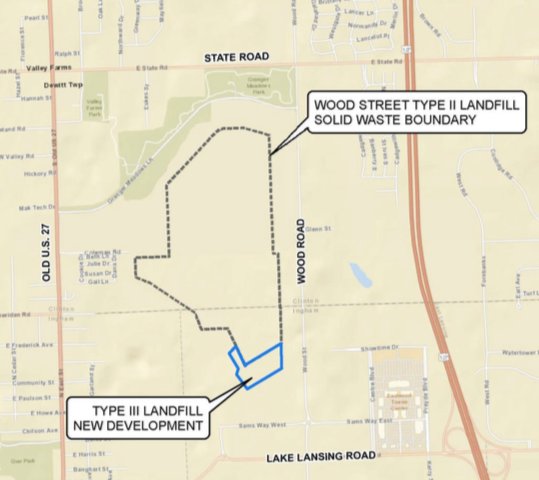
This diagram outlines the area north of Lake Lansing Road where the landfill expansion has been proposed.
WEDNESDAY, Dec. 5 — Local concerns over a landfill expansion off Wood Road likely won’t stand in the way of construction plans as officials at the Department of Environmental Quality continue to explore the proposal.
Granger Waste Services launched plans decades ago to expand a 230-acre landfill in Dewitt Township just north of the Clinton County border. Officials there want to expand southward into an additional 13 acres of Ingham County, but the plans have evoked at least some shades of criticism from the nearby Groesbeck Neighborhood.
“Anytime a landfill expands its footprint, especially with coal ash and contaminated soils, it causes concerns for neighbors about the impact on the community,” explained Lansing Township Supervisor Diontrae Hayes. “Contaminants are not a good idea. There have also been several complaints regarding the smell in that area.”
Granger bought the property in 1973 and had its solid waste plan approved by Ingham County at the turn of the century. By 2014, county commissioners passed a resolution in support of the expansion. Now, the company has been working to solicit public feedback as it finalizes its last remaining application with state officials.
The plan — if approved — would allow Granger to operate a Type III landfill that would exclusively collect fly ash and contaminated soils from construction projects, alongside its existing facilities. The addition would increase the landfill’s footprint by about 5 percent and grow its overall capacity by 3 percent, officials said.
But some local residents aren’t too thrilled about living closer to a growing pile of trash.
Jane Dailey, a longtime resident of the Groesbeck Neighborhood, voiced concern about the occasional odors that have filled her home. She doesn’t want to the putrid smell to grow worse and cautioned officials against the potential for environmental contamination, should the landfill spring an unexpected leak beneath the soil.
“We can’t judge the future, but we can judge someone by the past and these odor problems have impacted my life personally,” Dailey added, also suggesting quarterly groundwater monitoring in the area is simply “not enough.”
Ingham County Commissioner Thomas Morgan — citing the Flint Water Crisis — also suggested that residents should remain cautious about the plan given the somewhat recent missteps among state environmental officials.
Other local residents in recent weeks have voiced complaints about a possible increase in traffic along Lake Lansing Road and the effect on property values for homes and businesses in the nearby vicinity. But officials at Granger Waste Services have been quick to defend their plans and have countered virtually every concern.
“We appreciate the concerns,” said Granger spokeswoman Tonia Olson. “A landfill is really one of those things that is not necessarily thought of as favorable, but it’s something that we all need to have in our community.”
Olson doesn’t expect traffic to change. The existing landfill can already accept the same materials designated for the proposed expansion. The additional facility only allows officials to better segregate biodegradable trash from contaminated soils and other development-related waste. And they don’t expect any sudden influx of debris.
The “highly engineered” nature of the landfill — paired with routine environmental testing — will also ensure the area remains free of any potential contamination. The landfill is less than two miles from the Grand River, but Granger hasn’t damaged the environment in the last 50 years. And Olson doesn’t expect to start now.
The smell of trash is sometimes unavoidable ,but Olson said her company strives to ensure it doesn’t remain a consistent problem for the local neighborhood. Besides, the fly ash and compacted soils set to be collected at the expanded area of the landfill don’t decay and aren’t known to produce any sort of significantly offensive aroma.
Studies have also shown that smaller landfills that process fewer than 500 tons of waste daily — like Granger’s existing operation — don’t create much of an adverse effect on local property values like some residents have suggested. And a few extra acres tacked onto the site isn’t likely to create much of a change, Olson contended.
Only Hayes and Dailey spoke up against the proposal at a hearing last month. The DEQ, however, cannot legally base its application decisions on whether it has garnered support from the local community. Hayes also said the township ultimately carries no jurisdictional authority over whether the plan receives final approval.
“That direct oversight was given to the DEQ,” Hayes added. “And I don’t have a lot of faith in the process. It seems almost certain this is going to go through and I would have really hoped that the DEQ — especially with the contamination in different parts of the state — would really have lent an ear to what people have to say.”
Olson also said the Type III facility will be constructed under more rigorous standards usually reserved for Type II landfills. Officials also said groundwater contamination — if discovered — can only move about 30 feet per year. Quarterly testing would be able to spot any potential leakage well before it becomes a serious problem.
The public comment period on the proposal has closed and the DEQ has until Jan. 25 to either deny or issue the permit for expansion. Landfill tours are available on a daily basis. The full proposal, compiled in binders filled with thousands of pages, is available for reference at the Lansing Township offices.
Visit lansingcitypulse.com for continued coverage as the DEQ arrives at a decision on the landfill expansion.
Support City Pulse - Donate Today!
Comments
No comments on this item Please log in to comment by clicking here